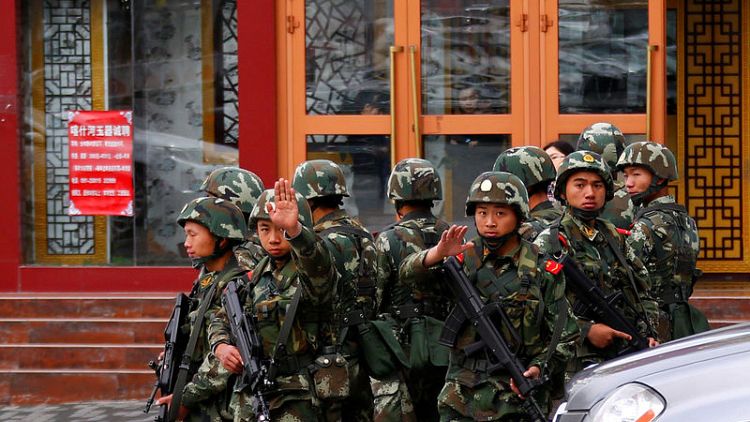WASHINGTON (Reuters) - Countries must hit China with sanctions over the mass detention of ethnic Uighurs, hundreds of scholars said on Monday, warning that a failure to act would signal acceptance of "psychological torture of innocent civilians".
Beijing has in recent months faced an outcry from activists, academics and foreign governments over mass detentions and strict surveillance of the Muslim Uighur minority and other ethnic groups in the restive western region of Xinjiang.
In August, a U.N. human rights panel said it had received many credible reports that a million or more Uighurs and other minorities are being held in what resembles a "massive internment camp that is shrouded in secrecy" in the region.
Representatives from a group of 278 scholars in various disciplines from dozens of countries called on China at a news briefing in Washington to end its detention policies, and for sanctions directed at key Chinese leaders and security companies linked to the abuses.
"This situation must be addressed to prevent setting negative future precedents regarding the acceptability of any state's complete repression of a segment of its population, especially on the basis of ethnicity or religion," the group said in a statement.
Countries should expedite asylum requests from Xinjiang's Muslim minorities, as well as "spearhead a movement for U.N. action aimed at investigating this mass internment system and closing the camps", it said.
China rejects criticism of its actions in Xinjiang, saying that it protects the religion and culture of minorities, and that its security measures are needed to combat the influence of "extremist" groups that incite violence there.
The country's Foreign Minister Wang Yi has said the world should ignore "gossip" about Xinjiang and trust the government.
But after initial denials about the detention camps, Chinese officials have said some people guilty of minor offences were being sent to "vocational" training centres, where they are taught work skills and legal knowledge aimed at curbing militancy.
Chinese foreign ministry spokesman Geng Shuang said on Tuesday China's Xinjiang policies stemmed entirely from the need to combat terrorism.
"We resolutely oppose any foreign forces trying to interfere with Xinjiang affairs and China's domestic politics," he said at a regular news briefing in Beijing.
Michael Clarke, a Xinjiang expert at Australian National University who signed the statement, told reporters that China sought international respect for its weight in global affairs.
"The international community needs to demonstrate to Beijing that it will not actually get that while it's doing this to a significant portion of its own citizenry," Clarke said.
(Reporting by Michael Martina; Additional reporting by Philip Wen in Beijing; Editing by Lisa Shumaker and Nick Macfie)
